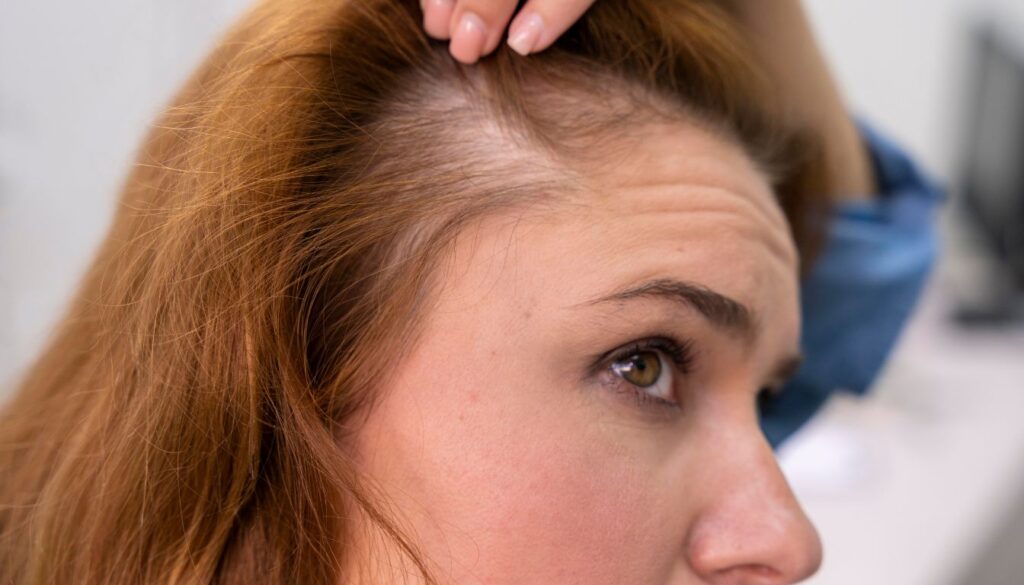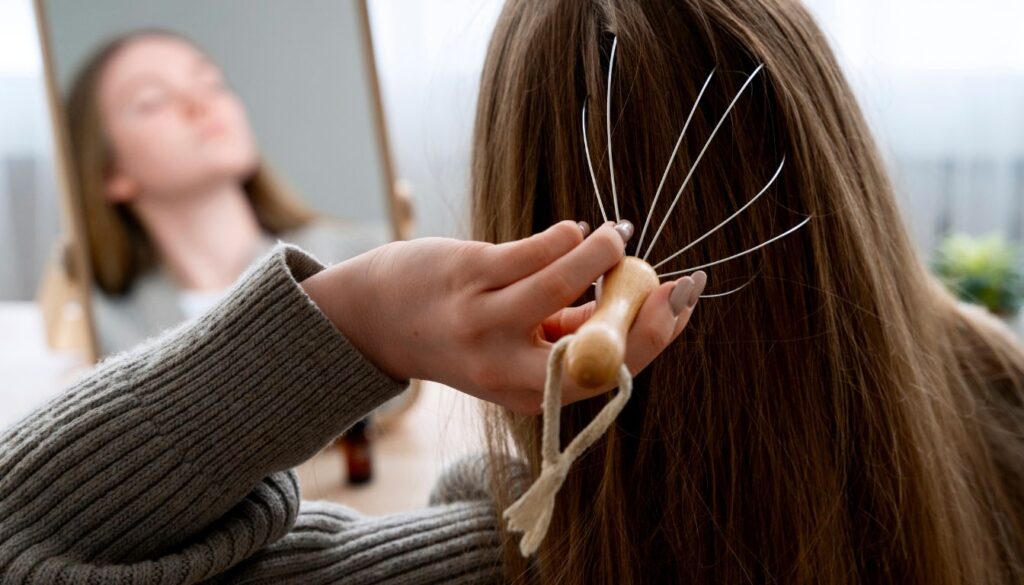Managing diabetes comes with many challenges, and one that often gets overlooked is hair loss. Many people are unaware that shifts in blood sugar levels can affect much more than energy and general health. If you’ve noticed thinning hair or bald spots, it may be worth considering the connection between diabetes and hair health.
Understanding this link is crucial. Not only can hair loss affect your self-esteem, but it can also indicate underlying issues related to diabetes management. In this text, I’ll explore the reasons behind hair loss in diabetics and share effective strategies to help you regain not just your hair, but also your confidence. Let’s dive into the details and uncover how you can take control of your hair health today.
Understanding Hair Loss With Diabetes
Hair loss can quietly sneak up on people with diabetes. It often signals underlying issues with blood sugar control, affecting self-esteem and overall well-being.
The Link Between Diabetes and Hair Loss – Hair Loss and Diabetes: Causes, Solutions for Hair Health
Diabetes affects blood flow and hormone levels. Poor circulation reduces nutrient supply to hair follicles, leading to thinning hair. Insulin resistance may also play a role, disrupting hair growth cycles. Studies show that hair loss can occur in individuals with both type 1 and type 2 diabetes. When blood sugar fluctuates, change can occur not only in energy levels but also in hair health.
Factors Contributing to Hair Loss in Diabetics
Several factors contribute to hair loss in people with diabetes. High blood sugar levels damage blood vessels, affecting hair follicles. Stress also takes a toll. It can lead to conditions like alopecia, resulting in patches of hair loss. Additionally, certain diabetes medications may have side effects, including thinning hair. Nutritional deficiencies can play a part too. A lack of essential vitamins and minerals, such as zinc and biotin, hinders healthy hair growth.
Factoring these elements helps create a clearer understanding of hair loss among diabetics. Addressing these issues may pave the way for healthier hair and boosted confidence.
Types of Hair Loss Associated With Diabetes

Diabetes can lead to several types of hair loss. Understanding these can help me manage my hair health better.
Alopecia Areata – Hair Loss and Diabetes: Causes, Solutions for Hair Health
Alopecia areata is an autoimmune condition. It occurs when the immune system mistakenly attacks hair follicles. In diabetics, this may be more common due to underlying inflammation and stress. It usually causes sudden patches of hair loss, which can be alarming. Finding ways to manage stress might reduce the risk of flare-ups.
Diffuse Hair Shedding
Diffuse hair shedding involves losing hair evenly across the scalp. This type can occur in response to blood sugar fluctuations or stress levels. When blood sugar remains high for prolonged periods, it impacts hair growth cycles. Unlike other forms of hair loss, diffuse shedding may not be noticeable until substantial thinning occurs. Maintaining stable blood sugar levels can help minimize this effect.
Managing Hair Loss With Diabetes
Managing hair loss with diabetes involves making specific adjustments and seeking treatments that support hair health. I want to share some effective strategies in two main areas: lifestyle changes and medical treatments.
Lifestyle Changes – Hair Loss and Diabetes: Causes, Solutions for Hair Health
Maintaining stable blood sugar levels plays a crucial role in hair health. I keep track of my diet, focusing on low-glycemic foods that won’t spike my blood sugar. Fresh vegetables, whole grains, and lean proteins cut. Regular exercise also helps. I aim for at least 30 minutes of moderate activity most days, like walking or cycling.
Stress management is vital too. Stress can worsen hair loss. I’ve found that yoga and meditation provide relaxation and help control my stress levels. Good sleep habits help as well. I try to get seven to eight hours of quality sleep each night. My morning routine includes a healthy breakfast to set the tone for the day.
Staying hydrated supports overall health. I make sure to drink plenty of water daily. Reducing smoking and avoiding excessive alcohol intake also contribute to healthier hair.
Medical Treatments
Consulting a healthcare provider is essential for anyone experiencing hair loss linked to diabetes. They can run tests to check nutrient levels, such as iron and vitamin D, which play a role in hair health. If I have deficiencies, my doctor may recommend supplements.
Topical treatments, like minoxidil, are worth discussing. This solution promotes hair growth by increasing blood flow to hair follicles. I learned some people benefit significantly from it. Finasteride is another option for men. This prescription medication helps block hormones that contribute to hair loss.
If hair loss stems from underlying diabetes management issues, addressing those can help. My healthcare provider may adjust my diabetes medications or recommend strategies for better blood sugar control. These adjustments often lead to improvements in hair growth.
Making lifestyle changes and exploring medical treatments can yield positive results. I focus on consistent practice, patience, and small victories as I work towards healthier hair.
Coping Strategies for Diabetics Experiencing Hair Loss
Managing hair loss with diabetes can feel overwhelming. I’ve found that using effective strategies can help restore both my hair and confidence. Below are some helpful methods.
Emotional Support – Hair Loss and Diabetes: Causes, Solutions for Hair Health
I know hair loss can hit self-esteem hard. Talking to someone supportive can make a big difference. Friends or family members often provide reassurance. Joining support groups allows sharing experiences with others facing similar challenges. It’s comforting to know I’m not alone in this journey. If needed, seeking professional counseling can offer additional emotional guidance. Taking care of my mental health supports my overall well-being.
Hair Care Tips
Hair care plays a crucial role in managing hair loss. I prioritize gentle shampoos free from harsh chemicals. It helps to limit heat styling tools to reduce damage. Using soft brushes instead of hard bristles prevents breakage. I also consider scalp massages. Massaging the scalp can boost circulation. Weekly hair masks with nourishing ingredients keep hair healthy and hydrated. Lastly, minimizing tight hairstyles prevents unnecessary stress on hair strands. Together, these tips can help promote healthier hair while I navigate my diabetes.
Before You Go – Hair Loss and Diabetes: Causes, Solutions for Hair Health

Managing hair loss while living with diabetes can feel overwhelming, but it’s essential to remember that you’re not alone. By understanding the connection between blood sugar levels and hair health, I can take proactive steps to improve my situation.
Adopting a balanced diet and incorporating stress management techniques can significantly impact both my hair and overall well-being. Seeking guidance from healthcare professionals can also provide tailored solutions that address my unique needs.
With the right approach and support, I can regain not only my hair but also my confidence. Embracing these strategies can lead to healthier hair and a more positive outlook on my journey with diabetes.
Don’t forget to add theherbprof.com homepage to your favourites so you don’t miss out on future articles.
References – Hair Loss and Diabetes: Causes, Solutions for Hair Health
Little Herb Encyclopedia, by Jack Ritchason; N.D., Woodland Publishing Incorporated, 1995
The Ultimate Healing System, Course Manual, Copyright 1985, Don Lepore
Planetary Herbology, Michael Tierra, C.A., N.D., Lotus Press, 1988
Handbook of Medicinal Herbs, by James A. Duke, Pub. CRP Second Edition 2007
The Complete Medicinal Herbal, by Penelope Ody, Published by Dorling Kindersley
Check the Following Article
Growing Ferns in Hanging Baskets: Beautify Your Home
Versatile Dwarf Palm: Transform Your Space with Elegance
Caladiums in Your Garden: Care and Beauty Simplified
Eggplant Health Benefits: Nourish Your Body Naturally
Frequently Asked Questions – Hair Loss and Diabetes: Causes, Solutions for Hair Health
How does diabetes cause hair loss?
Hair loss in diabetics is often linked to fluctuations in blood sugar levels. These fluctuations can lead to poor circulation and nutrient supply to hair follicles, disrupting normal hair growth cycles. Additionally, insulin resistance and other diabetes-related factors may contribute to hair loss.
What types of hair loss are associated with diabetes?
Diabetics may experience alopecia areata, an autoimmune condition where the immune system attacks hair follicles, and diffuse hair shedding, which results in even hair loss across the scalp due to blood sugar fluctuations or stress.
Can hair loss in diabetics be prevented?
Preventing hair loss involves maintaining stable blood sugar levels through a balanced diet, regular exercise, and effective stress management. Staying hydrated and avoiding smoking and alcohol can also support healthy hair growth.
What lifestyle changes can help with hair regrowth?
To encourage hair regrowth, include low-glycemic foods in your diet, practice stress management techniques like yoga, ensure adequate sleep, and stay hydrated. Additionally, engaging in regular exercise can improve overall health and support hair vitality.
When should I see a healthcare provider about hair loss?
Consult a healthcare provider if you notice significant hair loss associated with diabetes. They can check for nutrient deficiencies, recommend appropriate supplements, and adjust medications to improve hair growth.
What medical treatments are available for hair loss?
Medical treatments for hair loss related to diabetes may include topical options like minoxidil to promote hair growth. For men, medications like finasteride can help. Always consult a healthcare provider before starting any treatment.
How can I emotionally cope with hair loss due to diabetes?
Dealing with hair loss can be challenging. Emotional support is vital; consider talking to friends or family, joining support groups, or seeking professional counseling to help manage feelings of self-esteem or anxiety.
What hair care tips can help diabetics?
Diabetics should use gentle shampoos, avoid excessive heat styling, and regularly perform scalp massages to boost circulation. These practices can promote healthier hair and may mitigate some effects of hair loss.
